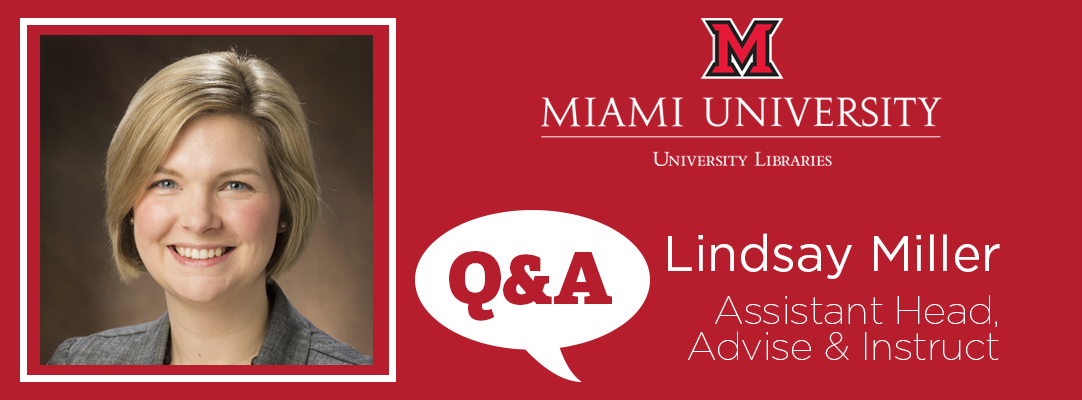
Lindsay Miller, a 12-year veteran of the Miami University Libraries, began a new role last month as assistant head of the Advise & Instruct Department.
The newly created position joins one of six new departments formed out of the University Libraries’ recent master planning process, which explored services, organization and facilities.
Advise & Instruct seeks to enhance Miami’s academic community through specialized guidance, instruction, and resource selection that encourages the use of the Libraries, inspires research and researchers, and fosters the growth of critical thinkers and lifelong learners.
Miller joined the Miami University Libraries as an academic resident librarian in 2006 and has served in a variety of roles and capacities – from communications coordinator to first-year experience librarian – during her time. She was promoted to associate librarian in 2013, and the development, coordination and scheduling of instructional programming have been central to her responsibilities.
In her new role, Miller directly supervises a team of librarians who are primarily focused on instruction and engagement while also having liaison and collection management responsibilities.
Lindsay earned her B.A. from Miami and her master’s in library and information science from the University of Kentucky.
She recently participated in a brief Q&A to discuss the evolving roles of University Libraries and the opportunities created by her new position.
Q: Talk about why this position was created.
A: The Advise & Instruct Department as a whole came out of the master planning process and looking forward to what type of library system we need to be in the future. That means a focus on student engagement and student success. It also takes a lifelong aim. My position, in particular, looks at how we integrate information literacy into the curriculum. These are all areas I’ve been working on as long as I’ve been here, and I’m excited to support an exceptional team of librarians in performing these important functions.
Q: Why is information literacy so important today?
A: There exists a misconception that, because of the Internet, everything is easier to access and all the information we need is now available at our fingertips. It’s actually more difficult to access good information today because there is so much to sift through. We have to equip students with the skills to evaluate information sources. It can be hard to tell the difference between what is even real or fake, let alone what is reliable and appropriate for the paper they’re writing. That’s a key focus for libraries and very important to our students as they move through majors and careers. Information literacy is directly tied to critical thinking.
Q: What role are the University Libraries already playing in information literacy?
A: We have had a lot of success integrating information literacy into first-year courses, like UNV 101 and ENG 111. We have also enjoyed success with our librarians working directly with faculty to promote information literacy through various classes or assignments. The hope is to structure and unify these various efforts behind an encompassing strategy that looks at the skills we’re developing in students as they progress throughout their Miami careers and lives.
Q: Talk about how the Advise & Instruct department is arranged and its early priorities.
A: Our guiding vision is a culture of sharing – using activities in the classroom as platforms to share and promote the repository of tools and resources the Libraries offer. Kevin Messner, head of Advise & Instruct, supervises the subject librarians. I support the librarians who focus on instructional initiatives and student engagement, which will soon include two new student success librarians, one focused on campus engagement and one focused on the experience of first-year and sophomore students. Campus engagement is foundational for student success, so we are excited about this new emphasis. We will also be building a team focused on creating digital learning tools and lesson plans that can be applied across subject specialists and adapted to specific classes and subjects.